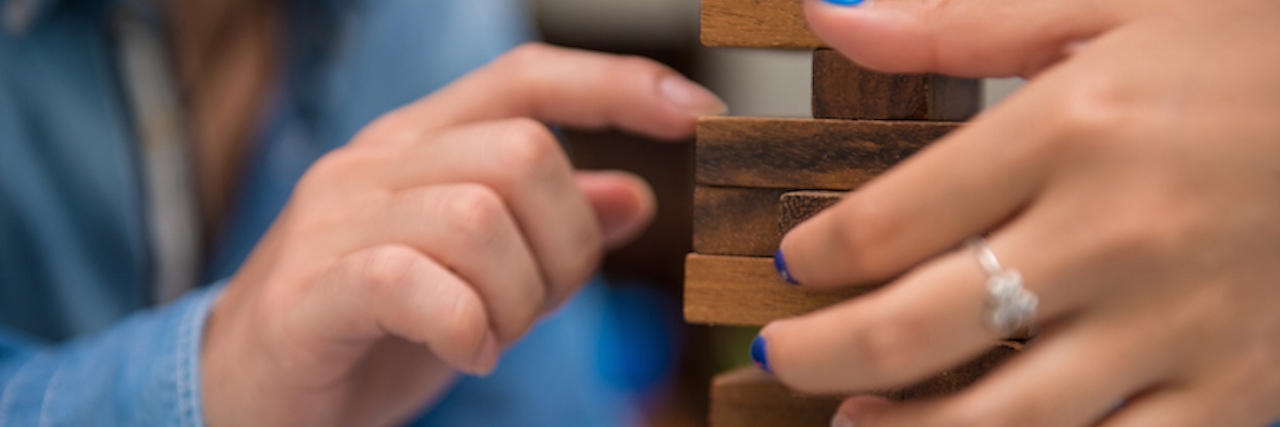Why Having an Autoimmune Disease Is Like Playing Jenga
Have you ever played Jenga? You know, that game where the wooden blocks are all placed in a neat tower? But each player has to take one out and put it on top. It’s all about balance and control. As the base of the tower gets pulled apart more and more, the top gets higher and higher. Eventually, the whole thing crashes (which is the real fun of the game, truthfully).
But when things crash in real life, it’s not quite so fun. Having an autoimmune disease is a lot like playing Jenga. Only we are the tower. Our immune systems are always on the attack. They go after blocks of muscles or joints and push them out of balance, or they pull at blocks of nerves, creating raggedy areas that can send tremors through our whole structure. They can even dislodge big blocks of energy that we can’t get back because the top of the tower is out of reach and always getting higher.
You see, a healthy immune system knows what is foreign and what is not. You catch a cold, it sees a virus, it attacks. End of story. With us, it’s not so easy. Our immune systems are confused about what to attack.
You say, “But I know people with…” and what? It’s not that bad? They don’t look sick? Or in the case of Sjogren’s syndrome, it’s just dry eyes and mouth? Back to Jenga for a minute. When you first start playing, does the tower look like it’s under attack? Does it look like it’s in imminent danger of collapse? Of course not. But it is. It’s exactly the same with us. Why do you think they are called invisible illnesses? The attack is all happening on the inside, through the blood to whatever the target of the day is. But just because our diseases work quietly on the inside, and just because the effects of our diseases aren’t as noticeable, that doesn’t mean we aren’t sick.
Remember the tower? Imminent collapse? Just like taking turns playing a game, the attacks on our bodies can happen in waves. They just happen over months or years so the effects aren’t always immediately noticeable. And just like in any war, troops take rest periods. So do our diseases. They hide on us. (As if we don’t have enough to deal with, there are mind games involved.) When I lived in Buffalo, New York, I used to play paintball in an old broken-down warehouse. I was the one everyone hated. I was too tall to be truly great at the athletic running part of the game, but I was deceptively good at folding myself up into tiny hiding spots. In other words, I camped and occasionally became the last one left to capture the flag for my team! But I camped. And camping — in the world of war games and autoimmune diseases — is not a good thing. Campers will always come back to bite you in the a**!
Which is exactly what autoimmune diseases do to us. They reawaken, reanimate, respawn or simply say, “Ready or not, here I come!” And we’re never ready. How could we be? We never know what’s coming or what will be attacked next. Which is the final issue with having an autoimmune disease — it attacks a lot more than you think. The immune system is programmed to attack, and without a cure, the attacks just get worse and worse and worse. Each disease may have its main objective: Rheumatoid arthritis is connective tissue, Sjogren’s syndrome is moisture-producing tissue, and myositis is muscle tissue; but if you truly think about it, everything is connected to everything else in our bodies, so where’s the borderline?
Connective tissue is everywhere, even in our lungs and our eyes. And speaking of eyes, the irises are made up of tiny muscles. And Sjogren’s syndrome — the “dry eye, dry mouth, it can’t be that bad” thing? Think about this for a minute: Every single system in our body uses moisture — every single one to do every single thing. Sjogren’s is not a disease that attacks just the eyes and mouth. It attacks moisture-producing centers of the body. Everywhere. Head to toe, root to tip.
That’s the thing: Autoimmune diseases don’t attack body parts. They attack systems. They attack bodies — our bodies. The bodies of people you know and love. They may pick and choose what to attack first in each person, just like you choose which block to pull out when it’s your turn in Jenga. But eventually, the attack spreads and the tower falls. It’s no joke and or lie. And it will happen over and over. In Jenga, you scoop it up, rebuild and start over. In life, we do what we need to. We take medicine, take a sick day, take to our beds. For me, it means going back to the doctor again. My tower is not so stable right now and I don’t know why.
But what it doesn’t mean is falling to pieces while someone yells, “Jenga!”
The Mighty is asking the following: What’s one thing people might not know about your experience with disability, disease or mental illness, and what would you say to teach them? If you’d like to participate, please send a blog post to community@themighty.com. Please include a photo for the piece, a photo of yourself and 1-2 sentence bio. Check out our Submit a Story page for more about our submission guidelines.

